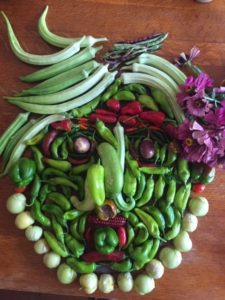
Photo courtesy Kerry Drake, Sunshine Community Gardens
Growing food gives you access to the absolutely most fresh and nutrient-rich produce, ensures that production processes are aligned with your values, reduces your food’s carbon footprint (no transportation needed!), and allows you to try varietals that grocery stores don’t offer. Edible gardens can be a cost effective source of produce, give you a sense of accomplishment, and provide low-impact exercise. Plus, there’s not much better than sharing a large bounty with friends, family, and neighbors!
Texas A&M AgriLife Extension’s in-depth research on edible plants can help inform many aspects of gardening. In this section, look for information on these and many more topics:
- Choosing the best vegetable, fruit, and herbs for Central Texas
- Seasonal planting times
- Improving soil
- Pest and disease management
- Our Favorite Gardening Resources
Think outside of the vegetable plot when planning your edible gardens. Fruit trees and vegetables can be incorporated into your ornamental landscape to save space. Why have coleus or begonias when you can plant Swiss chard? Herbs are easy to incorporate into planting beds too and often come with the added bonus of being pest resistant.
Extension holds free or low-cost public seminars on gardening and food preservation topics at various locations throughout the year. These interactive seminars help the public get more joy and productivity from their gardens, troubleshoot problems, and develop environmentally-sensitive gardening techniques. Check out our schedule of upcoming Seminars & Events.
Additional Edible Gardening Resources
Travis County Master Gardener Horticulture Hotline
Dinner Tonight – quick, healthy, cost effective recipes that taste great
